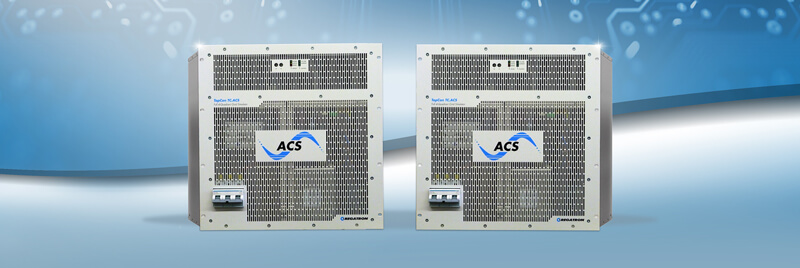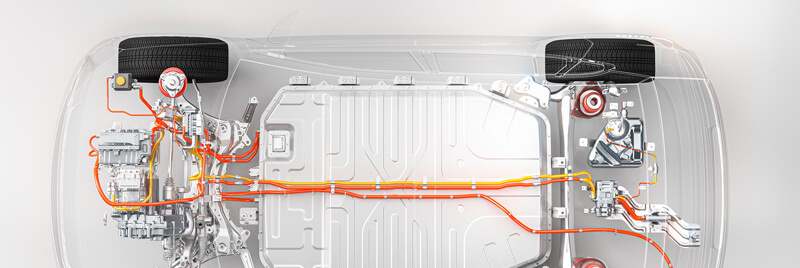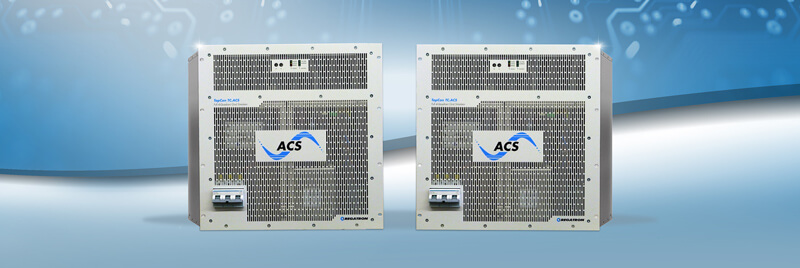Applications
From Application to the Right Power Supply
REGATRON offers programmable DC and AC power supplies for industry, laboratories, and academic research. From basic source or sink operation to demanding test and simulation tasks, our solutions cover a wide range of applications and requirements. In our overview you can explore typical application areas and the most suitable REGATRON product series for
each. Our modular, fully digital power supplies are designed for parallel, series, and matrix operation, deliver fast response times and high accuracy, and can be flexibly adapted to evolving needs. Can’t find your application? Contact our team – we’ll be happy to assist you.
Application Overview
AC Load Bank Testing
AC Load Bank Testing
AC load bank testing involves evaluating the performance and stability of AC power sources like generators, inverters, and grid interfaces under controlled conditions. Modern programmable AC load banks enable precise control over current waveforms and phase angles, allowing for the simulation of complex load profiles and dynamic conditions. This capability is essential for testing system responses to various scenarios, including harmonic distortion, unbalanced loads, and transient events, ensuring compliance with industry standards and reliable operation in real-world applications.
Anti-Islanding Testing
Anti-Islanding Testing
Anti-islanding testing verifies whether grid-tied power sources such as photovoltaic inverters can reliably detect unintended grid disconnection and shut down within defined time limits. Advanced setups use programmable RLC load emulation and grid simulation to create precise and reproducible islanding conditions. This enables thorough validation of inverter behavior in accordance with standards such as IEEE 1547 and VDE-AR-N 4105.
Battery Module / Pack Testing
Battery Module / Pack Testing
Battery testing involves subjecting modules and packs to controlled charge and discharge cycles to assess performance, durability, and safety. Key requirements include precise control of current and voltage, accurate measurement of energy and capacity, and the ability to simulate real-world load profiles. Testing setups must accommodate a wide range of voltages and currents, ensure reproducibility, and support automation for long-term cycling and data logging.
Battery Simulation
Battery Simulation
Battery simulation enables the realistic emulation of electrical and electrochemical behavior of batteries under both charging and discharging conditions. It allows for dynamic testing of power electronics, drive systems, and energy management strategies without the risks or variability of real battery cells. Key requirements include high control accuracy, fast response to current transients, and flexible modeling of battery parameters such as state of charge, internal resistance, and polarization.
Charger Testing
Charger Testing
Charger testing verifies the performance, safety, and grid compatibility of charging systems under real-world conditions. A typical setup includes a programmable grid simulator on the AC side and a battery simulator on the DC side of the device under test. Key requirements include bidirectional energy flow for V2G/V2H use cases, precise control of voltage and current, and the ability to simulate country-specific grid conditions and dynamic disturbances. This application supports testing of onboard chargers, charging stations, and compliance with global standards such as WLTP, IEEE 1547, and VDE-AR-N 4105.
DC Load Bank Testing
DC Load Bank Testing
DC load bank testing is used to verify the performance and stability of DC power sources such as batteries, fuel cells, DC-DC converters, and DC power supplies under defined load conditions. Typical requirements include fast current transients, wide voltage-current ranges, and multiple control modes such as CV, CC, CP, and CR. Precision, dynamic response, and flexible configuration are essential for applications in R&D and production environments.
Drivetrain Inverter Testing
Drivetrain Inverter Testing
Drivetrain inverter testing involves the evaluation of DC-side components in electric vehicle powertrains under dynamic and realistic operating conditions. Key requirements include fast response to load changes, wide current and voltage ranges, and the ability to emulate complex drive profiles. Safety functions such as insulation monitoring, emergency stop integration, and controlled discharge of residual energy are critical in test bench environments. This application supports validation of inverters and other power electronics in R&D, quality assurance, and end-of-line testing.
Electrochemical Impedance Spectroscopy
Electrochemical Impedance Spectroscopy
Electrochemical Impedance Spectroscopy (EIS) is a non-invasive method for analyzing the behavior of electrochemical systems such as batteries, fuel cells, and electrolysers. By applying a low-amplitude AC signal across a range of frequencies, the impedance profile reveals detailed information about charge transport, internal resistance, and system condition. The method enables precise, real-time diagnostics during operation and is widely used in research, development, and monitoring applications.
EMC Emission Testing
EMC Emission Testing
EMC emission testing verifies that electrical equipment meets standards for harmonic distortion and flicker in public power grids, such as IEC/EN 61000-3-2, -3-3, -3-11, and -3-12. The test setup simulates standardized grid conditions using programmable AC power sources and reference impedance networks. Accurate measurements of voltage stability, harmonics, and interharmonics are essential for compliance. Applications range from pre-compliance evaluation to full certification testing of grid-connected devices in development and production environments.
EMC Immunity Testing
EMC Immunity Testing
EMC immunity testing assesses the ability of electrical equipment to operate reliably under defined electromagnetic disturbances, such as voltage dips, fluctuations, harmonics, and frequency variations. Test procedures follow standards from the IEC/EN 61000-4-X series and require programmable AC sources capable of generating precise disturbance waveforms. Key requirements include fast voltage transitions, synchronized triggering, and automated test sequencing with report generation. Applications range from component validation to full system qualification in R&D and compliance labs.
Fuel Cell Simulation
Fuel Cell Simulation
Fuel cell simulation involves emulating the electrical behavior of real fuel cells to test and validate downstream systems such as inverters, DC-DC converters, and control electronics under defined conditions. Requirements include precise voltage-current control, fast dynamic response, and the ability to replicate non-linear characteristic curves, internal resistance, and transient behavior. Programmable DC power supplies with high accuracy and advanced control modes (CV, CC, CP, Ri-Sim) enable safe and reproducible testing of fuel cell-driven systems in development, validation, and integration environments.
Fuel Cell Testing
Fuel Cell Testing
Fuel cell testing evaluates the performance, efficiency, and stability of fuel cell stacks under real load conditions. Typical requirements include constant current or power operation, fast response to load changes, and protection against reverse currents to avoid degradation or damage. Electronic DC loads with high dynamics, programmable control modes (CC, CP, CV), and integrated safety features enable precise characterization of fuel cells in laboratory, R&D, and quality assurance applications.
Grid Simulation
Grid Simulation
Grid simulation is used to replicate real-world grid conditions in a controlled environment for testing power electronic devices such as inverters, chargers, and grid-tied systems. Key requirements include programmable voltage, frequency, phase asymmetries, and harmonic distortion. Full four-quadrant operation, fast response, and wide bandwidth enable dynamic scenarios such as voltage sags, flicker, and transitions between feeding and regeneration. This application is essential for development, compliance, and durability testing in renewable energy, e-mobility, and grid-interfacing technologies.
Inverter Testing
Inverter Testing
Inverter testing covers both DC and AC sides to validate functionality, performance, and compliance under realistic conditions. A programmable DC source emulates real-world inputs like batteries or solar arrays, enabling precise control of voltage, current, and transients for input characterization and MPPT evaluation. On the AC side, a grid simulator or AC load replicates grid behavior, including voltage dips, frequency shifts, and harmonics. Four-quadrant operation and real-time waveform control ensure accurate testing across a wide range of applications.
Power Hardware-in-the-Loop
Power Hardware-in-the-Loop
Power Hardware-in-the-Loop (P-HIL) integrates real power hardware with a real-time simulation environment in a closed control loop. A real-time simulator drives a power amplifier, which applies amplified signals to the device under test (DUT), while system responses are continuously fed back into the simulation. Key requirements include fast response times, precise current and voltage control, and regenerative operation for efficient energy use. P-HIL enables safe, repeatable testing of smart grids, electric vehicles, storage systems, and renewable energy components under realistic and dynamic conditions.
Solar Array Simulation
Solar Array Simulation
Solar array simulation enables the accurate emulation of photovoltaic (PV) behavior for the testing and qualification of PV inverters under controlled, reproducible conditions. Key requirements include high dynamic response, low output capacitance, and precise real-time calculation of I-V and P-V curves, especially for MPPT efficiency tests in accordance with standards like EN 50530. Advanced application software allows scripting, visualization, and data logging for comprehensive analysis. This application is essential for R&D, compliance testing, and quality assurance in PV inverter development.
Smart Grid Simulation and Testing
Smart Grid Simulation and Testing
Smart grid testing involves replicating dynamic grid conditions to evaluate the performance of distributed energy resources, storage systems, and grid-tied devices. Key requirements include the ability to emulate generation sources, energy storage, and load behavior in real time. Bidirectional DC power supplies simulate renewable inputs and energy consumption, while regenerative AC grid simulators recreate complex grid scenarios such as voltage sags, asymmetries, and islanding. This application enables reliable testing of smart grid components in R&D, grid integration, and energy systems optimization.
We’re Here for You
REGATRON supports you from the very first consultation to long-term operation – with solutions tailored to your application and
expert support. Selected power supplies are offered for rental.

Looking for the Right Power Supply?
We’ll help you find the ideal solution. Contact us today for expert, personalized support.













